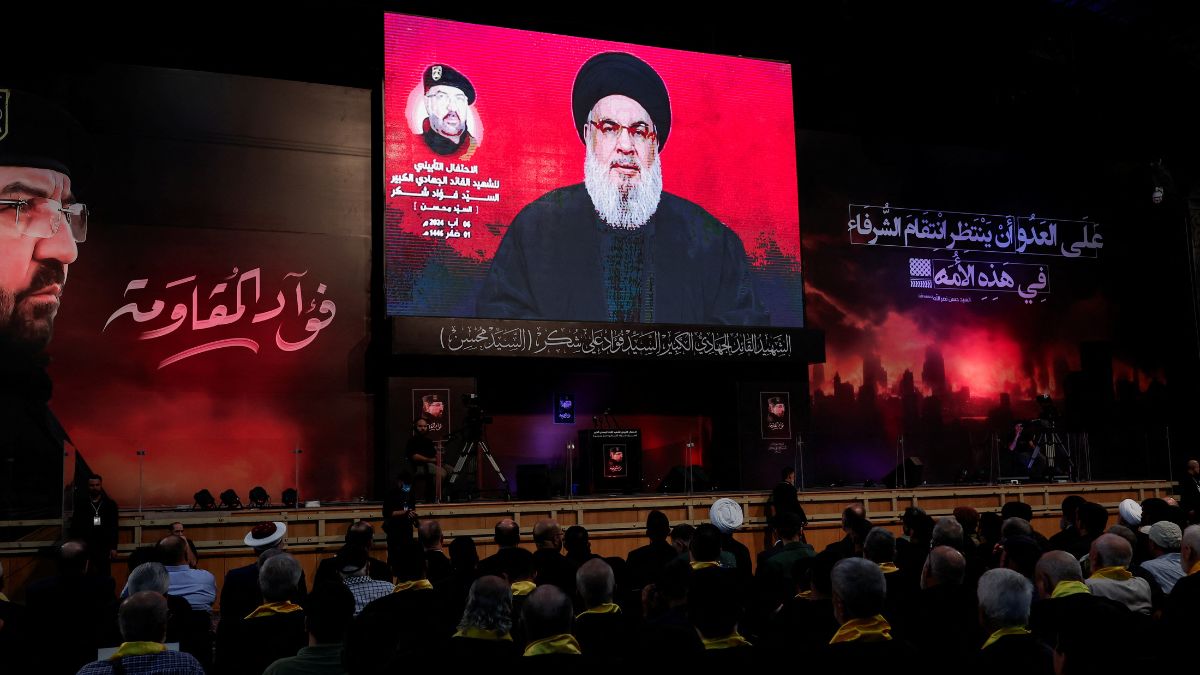) |
|
Hassan Nasrallah, the influential leader of Hezbollah, has shaped the group's rise from a local militia to a dominant political and military force in Lebanon and the broader West Asia. Known for his powerful speeches and strategic acumen, Nasrallah has played a crucial role in Hezbollah's conflicts with Israel and its alliances across the region. Nasrallah, born in 1960 in Beirut, Lebanon, into a poor Shiite family, was drawn to religion from a young age, studying at Shiite seminaries in Najaf, Iraq, under the influence of prominent clerics like Sayyed Musa Sadr. The Lebanese Civil War, which began in 1975, had a significant impact on Nasrallah's life. He joined Amal, a Shiite militia, before switching his allegiance to Hezbollah, a newly formed group dedicated to resisting Israeli occupation.
In 1992, following the assassination of Hezbollah's then-leader Sayyad Abbas Musawi by Israeli forces, Nasrallah assumed leadership. Under his guidance, Hezbollah expanded its military capabilities and political influence, becoming the largest political party in Lebanon. Hezbollah's military strength under Nasrallah has grown considerably. In a 2021 speech, Nasrallah claimed that Hezbollah had 100,000 fighters, making it one of the most powerful non-state armed groups globally. This power is not only a result of its military might but also due to its strategic alliances within the region, particularly with Iran and Syria.
Hezbollah's influence in the region is part of what is known as the “Axis of Resistance,” which includes Iran, the Syrian government, Palestinian groups like Hamas and Islamic Jihad, the Houthi movement in Yemen, and several Iraqi militias. This coalition is united in its opposition to Israel and Western influence in the region. Hezbollah is widely regarded as a terrorist organisation by the United States, the United Kingdom, Germany, Australia, Canada, the Gulf Cooperation Council, and much of the Arab League. The European Union designates its military wing as a terrorist organisation. However, countries like China and Russia maintain a neutral stance or engage with the group.
Under Nasrallah's leadership, Hezbollah has consistently engaged in conflict with Israel. The group's guerrilla warfare tactics, including suicide bombings and rocket attacks, have made it one of the most formidable opponents Israel has faced. The 2006 Lebanon War is a significant example of this, where Hezbollah's resistance led to a 33-day conflict that resulted in heavy casualties on both sides. Nasrallah's leadership is also marked by his strategic use of Hezbollah's military capabilities. In October 2021, he revealed that Hezbollah possessed 100,000 fighters, a testament to the group's strength. This military might has allowed Hezbollah to maintain a significant presence in Lebanon's political landscape and to act as a deterrent against Israeli aggression.
Nasrallah's influence extends beyond military conflict. Under his leadership, Hezbollah has become a key player in Lebanese politics. Despite not being an official government entity, Hezbollah holds considerable sway in Lebanon's political affairs. The group's participation in Lebanon's parliamentary elections since 1992 has solidified its position as a major political force. Hezbollah's involvement in regional conflicts, particularly in Syria and Yemen, has also shaped its image. In Syria, Hezbollah's support for President Bashar al-Assad during the civil war drew criticism, as it contrasted with the group's resistance against Israeli occupation. Nasrallah justified the intervention by arguing that the fall of Assad would weaken Hezbollah's position in the region.
Nasrallah's stance on Israel remains unwavering. He has consistently called for the destruction of the Israeli state, aligning Hezbollah with other groups like Hamas that share this goal. In recent years, Nasrallah has continued to assert Hezbollah's role in the region. During the ongoing Israel-Gaza conflict, Nasrallah praised Hamas's surprise attack on Israel on October 7 last year, calling it “heroic, courageous, creative, perfectly done and great act to which all salutes should be raised.” While Nasrallah is revered by many in Lebanon, particularly among the Shiite community, he is also criticised for turning Hezbollah into a powerful entity that challenges the sovereignty of the Lebanese state. His alignment with Iran has further strained Lebanon’s relations with other Arab countries.
Source: Who is Hezbollah’s Hassan Nasrallah, the man behind the militant movement in Lebanon?
